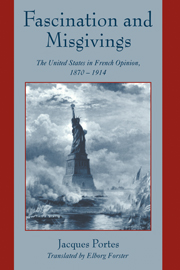Introduction
Published online by Cambridge University Press: 07 October 2009
Summary
The 1976 Bicentennial of the United States produced many events and publications in most of the industrialized countries, and not just in the land of George Washington. In the same manner, the last American presidential elections could be followed “live” in all French households that were interested in them, just as they were in many other countries.
These examples show, if it needs to be shown, the influence exerted by the United States on what by general agreement is called public opinion in many countries throughout the world. This rash of interest, an almost daily phenomenon, can be explained in many different ways: by economic power, strategic hegemony, or mass-produced culture, all of which came into being in the recent past. Yet the United States played an important role in European opinion, particularly in France, in earlier times, even in the absence of the reasons advanced today. This being the case, it can be asserted that the opinions expressed today about that great country are fed by all the data of the past, which constitute a kind of substratum without which such opinions would remain quite superficial.
Ever since its birth, the United States has played a determining role in French opinion. It has been relentlessly observed by writers from François-Jean de Chastellux right after gaining its independence, René de Chateaubriand a few years later, the still pertinent Alexis de Tocqueville, the young Georges Clemenceau, the social lion Paul Bourget, and the hostile Georges Duhamel to, more recently, Simone de Beauvoir and a great many more or less famous others.
- Type
- Chapter
- Information
- Fascination and MisgivingsThe United States in French Opinion, 1870–1914, pp. 1 - 16Publisher: Cambridge University PressPrint publication year: 2000

